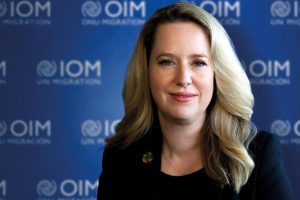Meet IOM’s first female boss
Former White House advisor Amy Pope is the new Director General of the International Organisation for Migration, the UN’s international migration agency.
Ms Pope, 49, defeated the incumbent Director General Antonio Vitorino, of Portugal, in a vote by member nations, and became the first woman to lead the agency.
Ms Pope had strong backing from the US while Vitorino was the EU’s candidate.
Vitorino came to the job five years ago after defeating a candidate put up by the Trump administration for the job that has traditionally been held by Americans.
 Observers say Me Pope’s win is a sign of a renewed push by the Biden administration to reclaim top posts in UN institutions, including the World Food Program, children’s agency UNICEF, and the International Telecommunications Union, in recent months following the Trump administration’s general disinterest in the United Nations.
Observers say Me Pope’s win is a sign of a renewed push by the Biden administration to reclaim top posts in UN institutions, including the World Food Program, children’s agency UNICEF, and the International Telecommunications Union, in recent months following the Trump administration’s general disinterest in the United Nations.
“It’s an incredible moment in time to lead the International Organization for Migration, and I could not be happier to stand before you today to start that work,” Ms Pope told reporters.
A former prosecutor, Ms Pope served as migration adviser to President Joe Biden early in his administration and recently was Vitorino’s deputy for reform and management.
The US and the EU are both major funders of IOM facing challenges with mass migration.
But critics have slammed the EU for failing to do more to prevent migrants from taking often-deadly boat trips across the Mediterranean Sea from North Africa to Europe.
Eight of the agency’s ten directors general since the International Organization for Migration was founded 72 years ago have been American. The organization has nearly 19,000 staff members working in 171 countries to promote “humane and orderly” migration.
US Secretary of State Anthony Blinken said in a statement: “Ms Pope’s election reflects a broad endorsement by member states of her vision to keep people at the heart of IOM’s mission, while implementing key governance and budget reforms to ensure IOM is prepared to meet the challenges it faces.”
Recently, the US has been criticised by other UN institutions, notably IOM’s sister agency UNHCR, over its migration policies at the US-Mexico border.
“The situation at the southern border of the United States underscores why it’s so critical that we approach migration from a much more comprehensive point of view. Many of those migrants have gone through extraordinary circumstances to end up at the,” Ms Pope said.
“As the director-general for the International Organization for Migration, I’m not working for the United States government, So my view is that it is important that we as an organization call out practices, no matter who they’re coming from, and acknowledge whether they work or they don’t work,” she said.
But Ms Pope is likely to face extra scrutiny over whether she speaks out against any perceived missteps in Biden’s migration policy, and she alluded to the difficulties faced by migrants who trek across Central America to reach the United States.
Before joining IOM, Ms Pope was the Senior Advisor on Migration to President Biden in 2021, Deputy Assistant to the President and Deputy Homeland Security Advisor from 2015-2017, and Special Assistant to the President and Senior Director on Transborder Security from 2013-2015.
At the White House, she developed and implemented comprehensive strategies to manage migration surges, address trafficking in persons, respond to the Zika and Ebola outbreaks, and prepare communities to react to climate crises.
Since then, she has continued to promote dialogue on global migration challenges through her academic writing and work with Chatham House. She has also occupied positions at the US Department of Justice and US Senate and was a Partner in the London-based law firm Schillings.
More recently, during her tenure as Deputy Director General, Ms Pope is said to have implemented a series of budgetary, management and administrative reforms to optimize IOM’s field delivery and risk management, enhanced internal justice outcomes and operational results, and strengthen coordination with the United Nations system.
IOM’s job, through its 560 field offices is to provide migrants with food, water, shelter and help with government-imposed paperwork. The agency also collects and shares vast amounts of data about flows of people to governments, and advises them on policy decisions.
Mr Vitorino, a former European Union commissioner for Home and Justice Affairs, won praise for boosting the budget and staff at IOM, helping to hire and promote more women into top positions, and reaching out to developing countries.












